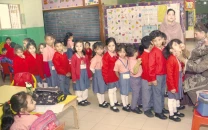Sindh Health Care Commission becomes temporarily non-functional
Health minister will appoint commission's new chief

PHOTO: FILE
The date for the nomination or election of the new chairperson, or the nine commissioners that elect the chairperson, has not been announced as yet.
The SHCC was created three years ago in 2016 and Prof Tipu Sultan was elected as its first chairperson. According to the organisational structure, nine commissioners are included in the commission which elects the chairperson via anonymous voting. However, the Health Minister Dr Azra Fazal Pechuho has taken the authority herself to select the chairperson this year.
World Bank debunks Sindh's stats on $433m project
According to sources, a meeting presided over by Pechuho, was held on Friday in which it was agreed that the health minister will directly appoint the chairperson. The appointment of the nine commissioners will also be done through the approval of the health minister. The meeting was attended by the former chairperson and the commissioners.
The bill to establish the SHCC, for the monitoring and surveying the performance of all the private and government hospitals, clinics, maternity homes, pharmacies and laboratories and determining the fees, was approved by the Sindh Assembly in 2014. Two years later in 2016, the structure of the organisation was created making the commission functional.
Initially nine people were appointed as the commissioners who elected the chairperson by using their right to vote secretly. Sultan was elected as the first chairperson of the commission on April 14, 2016, whose three-year term in the office will end on Sunday. The terms of all the nine commissioners were completed on Saturday making the commission temporarily non-functional.
Sindh government hasn't made any announcement regarding the vacant positions. The notification for the completion of the term of nine commissioners could not be issued by the provincial government. The Sindh health minister will announce the name of the new chairperson.
According to sources, the chairperson and commissioners used to charge Rs20,000 per session instead of salaries. In addition to this, the expense of their stay and food during their visit to interior Sindh is also paid by the commission. The team is also provided with the travelling allowance and dearness allowance (TA DA) in addition. Organising a session after every three months is mandatory according to the rules of the SHCC.
In contrast to this, sources said that the sessions that had been organised under the commission were surprisingly much more than the sessions required as stated in the rules in an attempt to increase the amount of money earned by these officials. A total of 12 sessions were organised in a year.
The former commissioners of the SHCC include the former Dow University of Health Sciences (DUHS) vice-chancellor Saeed Qureshi, former Dr Ruth Pfau Civil Hospital medical superintendent Dr Hussain Bakhsh Memon, Nawaz Laghari, Dr Iqbal Memon, Zahid Bashir and others.
Eligibility criteria
The commission's rules state that for a person to be eligible for appointment to the position of chairperson or commissioner they must not be the owners of any government or private organisation nor should they hold any office in any private or government organisation. However, during his tenure as a commissioner, Qureshi served as the VC of DUHS and the director of the board of governors of the trauma centre. Dr Memon, on the other hand, is the owner of a nursing school while the rest of the four commissioners are also associated with private organisations. This means that their appointment or nomination must have been done through violating the SHCC rules.
Govt to provide health card to 15 million families
Organisation expenditure
Sources said that Sindh government is paying Rs1.3 million as rent for the commission's office established on the second floor of the FTC building. The SHCC office was shifted from Clifton to FTC building a year ago. The area of this office is approximately 2,500 square feet and the provincial government has paid more than Rs12.5 million as rent during the past year.
The commission has registered 4,500 hospitals and clinics in the province during the last three years and issued licences to them. The licence fees have been fixed according to the standard of the hospitals and clinics.
Published in The Express Tribune, April 14th, 2019.



















COMMENTS
Comments are moderated and generally will be posted if they are on-topic and not abusive.
For more information, please see our Comments FAQ